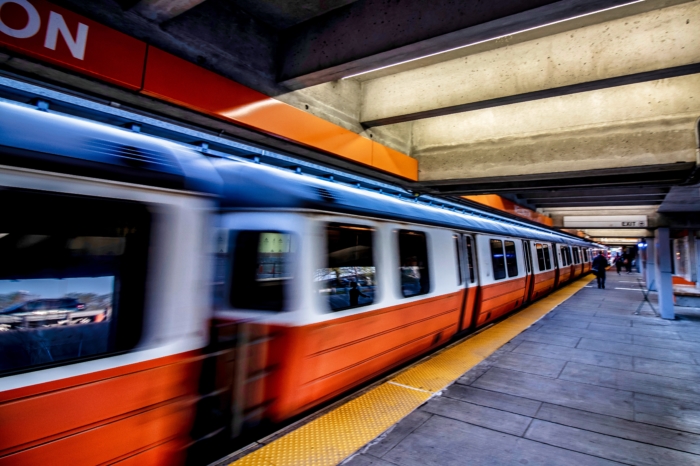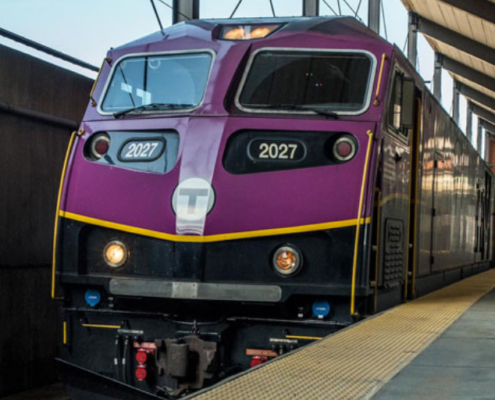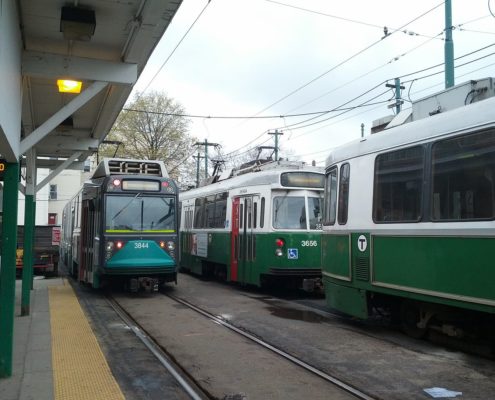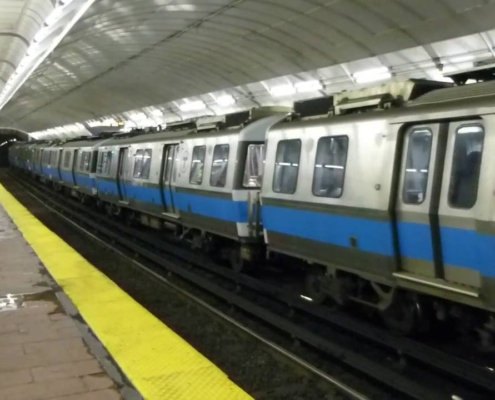Study Calls for Easing MBTA Procurement Restrictions and Beefing Up Project Management Capacity
Reforms needed if T is to achieve increased capital spending targets to modernize the system and boost ridership
Media Inquiries: Contact Micaela Dawson, Communications Director, mdawson@pioneerinstitute.org
BOSTON – The Massachusetts Legislature must free the MBTA from overly restrictive procurement methods and the T must dramatically increase its project and contract management capacity if it is to reach aggressive capital spending targets aimed at upgrading the system and accommodating more riders, according to a new study published by Pioneer Institute.
“The MBTA will need to change the way it does business and the Legislature will have to remove unnecessary restrictions if the T is to modernize and consistently provide riders with high-quality service over time,” said Greg Sullivan, who co-authored “The MBTA’s Capital Spending Crisis” with Ian Ollis.
MBTA heavy rail (Blue, Orange and Red Lines) ridership plateaued around 2014, when it effectively reached rush-hour capacity, and has since been falling relative to population growth. Red and Orange Line modernization plans would change that, with signal upgrades and new trains that would increase capacity on the Red Line by half and on the Orange Line by 40 percent.


But the project has been beset by delays. Orange Line trains expected to enter service this summer were scheduled to be in use last year; none of the modernization plan’s big-ticket items are complete; and a new MBTA fare collection system is delayed indefinitely.
Overly restrictive procurement
Among the causes of the delay are overly restrictive procurement practices. For example, on subcontracts worth more than $100,000 that are part of contracts over $10 million, the MBTA is subject to the so-called filed sub-bid law. Under the law, the Division of Capital Asset Management and Maintenance pre-qualifies subcontractors, then the T must do so again. After subcontractors submit their bids, general contractors submit their own bids, together with their choice of which subcontractor they plan to use. If there are fewer than three pre-qualified subcontractors, the process must start over. Unhappy subs can also appeal to the Attorney General’s bid protest unit.
The MBTA is the only U.S. transit system that operates under these rules, which discourage subcontractors from bidding, delay procurement, and drive up prices. The Legislature should exempt the T from this procedure, as it has for several other state agencies, and instead allow it to use any procurement procedure the Federal Transit Administration has identified as a best practice.
Get Our Fix the T Updates!
Recruit and retain capital delivery talent
The MBTA has doubled annual capital spending in recent years (currently between $900 million and $1 billion annually), but the T needs to be spending $1.6 billion annually to keep up with its Capital Investment Plan. Current projects in the pipeline will reach spending of $2.3 billion per year in 2021 but this will fall dramatically in the following year again. Despite spending more, the T still fell short of the $1.6 billion that is available to spend per annum in fiscal 2019.
In the past, it has taken about four years for actual spending to catch up with planned capital plan expansion. “If the past is prologue,” said Pioneer Executive Director Jim Stergios, “keeping up with targets will pose a very difficult challenge for the T.”
Historically, the MBTA has revised spending targets downward when it became clear they wouldn’t be reached. The original 2015-19 Capital Investment Plan set a $1.403 billion target for fiscal 2016, but when the actual 2016 budget was published, it called for spending $1.046 billion, a reduction of more than 25 percent.
To improve capital performance, the MBTA has hired a chief of capital programs and plans to hire 80 more full-time project and contract managers.
In addition to achieving short-term spending goals, the MBTA must also convert problems into bankable projects if it is to sustain improvements and spending. The current plan calls for spending $2.3 billion in fiscal 2021, but that number falls back to $861 million by 2023 due to a lack of projects in the pipeline.
“Current MBTA staff have managed to double capital spending,” said co-author Ian Ollis. “Doubling it again and then sustaining it at around $1.5 billion annually will require additional expertise.”
Sullivan and Ollis also call for the MBTA to develop a detailed, project-specific plan for each year in the five-year capital plan, and for reporting capital spending in accordance with the Governmental Accounting Standards Board to promote transparency.
About the Authors
Gregory Sullivan is Pioneer’s Research Director, and oversees PioneerPublic and PioneerOpportunity. Prior to joining Pioneer, Sullivan served two five-year terms as Inspector General of the Commonwealth of Massachusetts by appointment of the Governor, Attorney General, and Auditor. Prior to serving as Inspector General, Greg held several positions within the state Office of Inspector General. Sullivan was a 17-year member of the Massachusetts House of Representatives, serving on the committees of Ways and Means, Human Services, and Post-Audit and Oversight. Greg holds a bachelor’s degree from Harvard College, a master’s degree in public administration from The Kennedy School of Public Administration at Harvard, and a master’s degree from the Sloan School at M.I.T., with a concentration in finance.
Ian Ollis is a former South African Member of Parliament having served two terms. He was the Shadow Minister of Transportation, Shadow Minister of Labor, and Shadow Minister of Education during this time. In 2013 he drafted the Democratic Alliance national Transportation Policy. During his time as Member of Parliament Ian exposed a number of cases of corruption leading to major reforms. Previously Ian served as a City Councillor in Johannesburg, serving on the Transportation and City Planning Committees. He has a Masters Degree in Arts from the University of the Witwatersrand in South Africa. Ian is currently completing a City Planning Masters degree in transportation at M.I.T. and interning at Pioneer Institute as a Senior Research Analyst developing a transportation policy platform.
About Pioneer
Pioneer Institute is an independent, non-partisan, privately funded research organization that seeks to improve the quality of life in Massachusetts through civic discourse and intellectually rigorous, data-driven public policy solutions based on free market principles, individual liberty and responsibility, and the ideal of effective, limited and accountable government.
Make a tax-deductible gift below to support our campaign to #FixTheT.
Related Posts




















